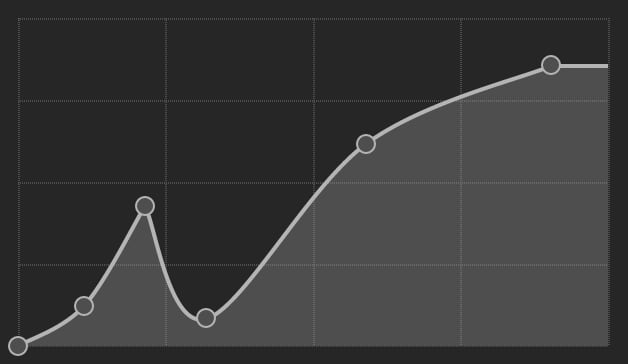13 releases
| 0.3.1 | Apr 11, 2025 |
|---|---|
| 0.2.0 | Mar 12, 2025 |
| 0.1.10 | Sep 15, 2024 |
| 0.1.8 | Oct 15, 2023 |
| 0.1.3 | Nov 14, 2020 |
#210 in Math
308 downloads per month
Used in 2 crates
(via sl-map-apis)
28KB
369 lines
uniform-cubic-splines
Uniform cubic spline interpolation & inversion.
This crate supports the following types of splines:
- B-spline
- Bezier
- Catmull-Rom
- Hermite
- Linear
- Power

Curve widget with a 1D Catmull-Rom spline with non-uniform knot
spacing and knot multiplicity using this crate for interpolation
(drawn using tiny-skia).
The crate uses generics to allow interpolation of any type for which certain traits are defined.
I.e. you can use this crate to interpolate splines in 1D, 2D, 3D, etc.
[dependencies]
uniform-cubic-splines = { version = "0.1" }
Example
Using a combination of spline() and spline_inverse() it is
possible to compute a full spline-with-nonuniform-abscissæ:
use uniform_cubic_splines::{
basis::CatmullRom, spline_inverse, spline,
};
// We want to evaluate the spline at knot value 0.3.
let x = 0.3;
// The first and last points are never interpolated.
let knot_spacing = [0.0, 0.0, 0.1, 0.3, 1.0, 1.0];
let knots = [0.0, 0.0, 1.3, 4.2, 3.2, 3.2];
let v = spline_inverse::<CatmullRom, _>(x, &knot_spacing).unwrap();
let y = spline::<CatmullRom, _, _>(v, &knots);
assert!(y - 4.2 < 1e-6);
Features
monotonic_check-- Thespline_inverse()/spline_inverse_with()code will check if the knot vector is monotonic (on by default).
Background
The code is a Rust port of the implementation found in the Open Shading Language C++ source.
If you come from a background of computer graphics/shading languages used in offline rendering this crate should feel like home.
Dependencies
~160KB